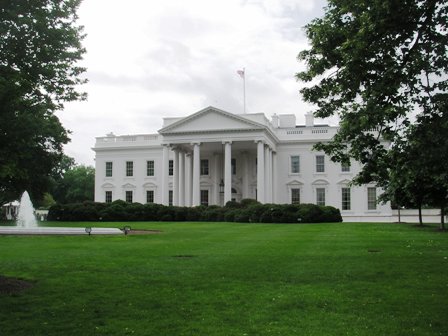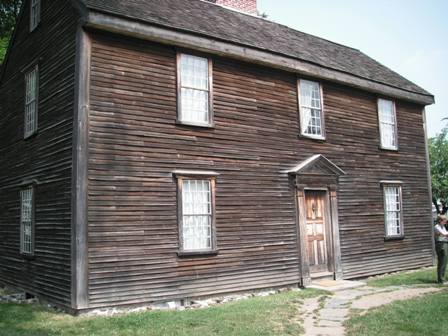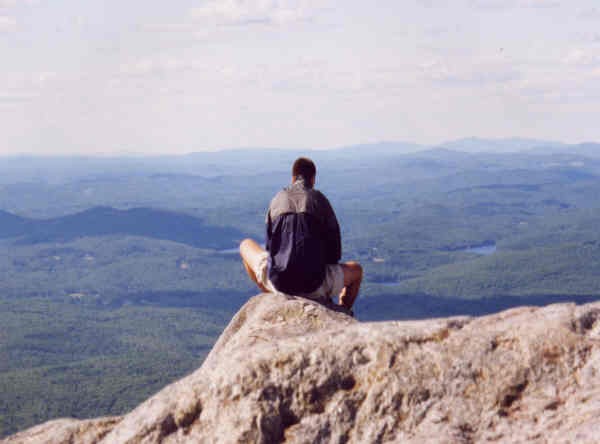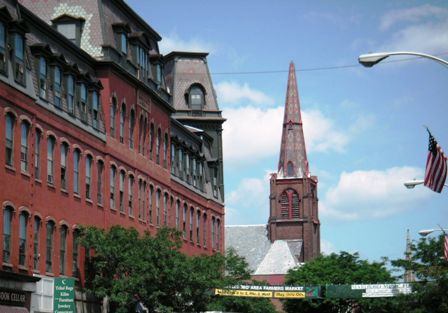|
the presidency (ch 12)
Reread Article II of the US Constitution
To knock on the door of 1600 Pennsylvania Avenue, go to http://www.whitehouse.gov/.

Points to ponder:
1. In addition to the constitutional powers of the president, one should also take into account certain political resources of the office, resources which if used wisely can significantly amplify his constitutional powers
- the solitary president is the undisputed head of the executive branch, something no one in Congress can claim for the legislative branch, and he is backed by a huge White House operation as well as the bureaucracy of which he is the nominal boss; as a result, the president has a relatively great ability to control his political world
- because of his status, the president can draw on the information and expertise of the White House staff, the bureaucracy, and experts outside of government
- the president is the focal point of the government and as such has the benefit, and sometimes the disadvantage, of unparalleled media attention; think of how immediately and with what force all eyes turned to President Bush after the attacks on September 11 and during the economic meltdown in fall 2008; in this connection, one can often trace power grabs by presidents to the appearance of a crisis (again, think of the Patriot Act and think of the massive intrusion of the government into the economy after the fall 2008 financial crisis)
- the balance of power can tip toward the presidency because over time foreign affairs issues have become more important and the president has relatively more constitutional power in this area (recall the discussion--Coleman et al., 418-20--about Congress, the president, and war-making)
- the president is regarded as the leader (Coleman, et al.: 459)of his party and so others from his party, notably in Congress, would like to support him all other things being equal
- on the other hand, party members do sometimes desert the president, their party leader, as recently happened rather spectacularly on the question of closing Gitmo and possibly moving detainees onto the US mainland (in members' districts [D.D. Kirkpatrick & D.M. Herszenhorn, "Guantano closing" NYT 27 May 09 )
- the president also has selected rewards and sanctions at his command—he can offer campaign assistance, he can influence bureaucratic decisions, and he has many plum positions to fill, to name just a few
2. Political scientists refer to the “institutionalized presidency” to capture the growth of the presidency as an organization, a process in which the second President Roosevelt and presidents since have built up the Executive Office of the President (look at http://www.whitehouse.gov/government/); the White House’s EOP listing doesn’t include what is called the White House Office; WHO names, titles, and salaries in 2009 are given in a White House document
3. The growth of the institutionalized presidency is in part a function of most presidents’ dissatisfaction with their cabinets and a desire to build up a group of advisors and assistants personally chosen for their skills and loyalty
4. Even though the constitutional system was carefully balanced to allow each branch to check the others, the president has the advantage of being head of state as well as chief executive and so is the focal point for citizens, and, as a result, the single person who gets the most amount of media attention; there is a psychological element to this, as well, since our first reference point for things political and governmental as children is the president (a point to be developed further when we talk about political socialization later in the term)
5. Although Congress is the understood to be the legislative branch of US government, it turns out that presidents have a major influence on the legislative process, influence that is exercised in a variety of ways (of course, none of these are fool-proof)
- presidents can use their ability to attract media attention ("going public," [Coleman et al.: 458]) to set the agenda (witness President Bush’s travels across the country on behalf of his call for changes in Social Security--though, it is worth noting, for all the mileage he got nowhere on the issue)
- while only members can introduce legislation in the House and Senate, many bills in fact are drafted by the executive branch and introduced on behalf of the president, and so the president’s draft is the basis on which Congress often begins its legislative work
- starting in the 1930s, presidents have insisted that the Office of Management and Budget, one of the EOP units, will exercise “central clearance,” which is to say that before executive branch agencies can pass off one of their proposals to Congress the OMB has to review and certify it as being in accord with the president’s program (though, it is fair to say, wily and fearless bureaucrats find ways to circumvent the OMB)
- since the Budget and Accounting Act of 1921, the president is required to submit to Congress a budget proposal which Congress never adopts but which can subtly shape the congressional process (the President's budget for fiscal year 2013 which begins in October 2012 is yours for the clicking )
Recalling the data on legislative support scores (p. 446) and the qualifications on their validity (445) and adding the observation that these scores are not weighted which means getting Congress to follow the president on a small matter is counted the same as winning its support on an item the president regards as an important initiative, we can specify a variety of circumstances when, all other things being equal, presidents are more likely to be effective in leading Congress to do what he wants
- early in the term
- the stronger his party's representation in Congress
- the higher his mass approval ratings (455-58)
- in foreign affairs (as opposed to domestic policy items [463])
- in times of perceived crisis
- when the president and his staff are relatively skillful (compare, e.g., Reagan v Carter)
6. The veto is an important element in presidential power, but it turns out it is used relatively rarely (though overrides are rarer still); the trick of the veto is its use as a threat—members of Congress, when faced with a veto threat, are often inclined to search for a compromise acceptable to the president in order to avoid a veto
in cases of divided party government, in particular, a president can exercise considerable power with his use or threat of a veto so long as his party has even a third of the membership in the House or Senate
because the president doesn't have a line-item veto, Congress may use the strategy of attaching to a bill the president wants to sign an unrelated item the president opposes, as for example the provision to allow visitors to carry concealed weapons, where state laws permit them, into national parks which was added to the credit card reform law in May 2009 (C. Hulse, "Advocates of gun rights"NYT 19 May 09)
7. Presidents have often claimed prerogative power, or what Coleman et al. (p. 440, 450) refer to as “inherent power,” a president’s sort-of “necessary and proper clause” drawn from the constitutional instruction that he “take care that the laws be faithfully executed” (II..2.3); among the prerogative powers that presidents have claimed at various points (sometimes to be challenged, rebuffed, and turned back) are the rights to
- withhold information from Congress and the courts on the grounds of “executive privilege”
- refuse to spend money appropriated by Congress (“impoundment”)
- issue executive orders (450) relative to the implementation of the law (consider this less than admiring perspective on President’s Clinton use of executive orders; see also the 40-odd webpages of executive orders and presidential memoranda issued by President Obama to date); there is a whole class of what is called "direct executive action" including not only these executive orders and presidential memoranda but also presidential letters, national security directives, presidential proclamations, and presidential signing statements designed to seize control over public policy
- enter into executive agreements(450) with other nations rather than negotiate treaties which then must be ratified by the US Senate (more than 90% of the international agreements entered into by the US since 1939 have been executive agreements rather than treaties [Klarevas: 2003]; the constitutional status of these executive agreeements seems unresolved)
- use military force without a declaration of war by Congress (see the thirty-page list of military conflicts in which the US has been involved, and note that about 18 pages of the list cover events since the last time Congress declared war, which was in 1941)
deserving special mention is the argument aggressively pushed by the George W. Bush presidency about the unitary executive (Coleman et al.: 442) to justify presidential powers even when they are challenged by Congress or the courts
Questions to consider:
1. Richard Neustadt (1980:9), who worked in the Truman administration and was for many years a political scientist at Harvard, recounted what Truman expected to happen to his successor, President Eisenhower: “He’ll sit there and he’ll say, ‘Do this! Do that!’ And nothing will happen. Poor Ike, it won’t be a bit like the Army. He’ll find it very frustrating.” Based on his experience in government and many years of studying the presidency, Neustadt concluded that “the power of the president is the power to persuade.” What does he mean by this?
2. Could you say where you were on a certain day, six or nine years ago? Ask family members and friends who are older than 50 where they were about noon on 22 November 1963. What do the results tell you?
3. Historian Arthur Schlesinger, Jr. who worked as an aide to President Kennedy and who wrote a multi-volume history of the early days of the New Deal, wrote a book in the 1970s (during the Nixon administration) lamenting what he saw as too much growth in presidential power. Schlesinger said we were now faced with an “imperial presidency” in which the president had become a caesar, an emperor. Maybe that was then, but what about now? Is the US presidency too strong?
4. Watergate: What is it? What was it? What were, are its consequences?
5. In his first six years in office, President George W. Bush cast only one veto but in 2007 he cast seven, and he cast four more in 2008. Why? Was he just a slow learner?
6. What do you think about proposals to give the president a line-item veto? Good? Bad? For whom?
7. There was some controversy during the George W. Bush administration (including reservations about the practice from then-Senator Barack Obama) about presidential signing statements (Coleman et al. [453] give, I believe, an inadequate and overly sunny description). What are presidential signing statements, and from what do presidents derive their authority to issue them? Has Obama changesd his opinion of them? What do these signing statements say about our constitutional system?

John Adams birthplace, Quincy, MA. On he other hand, check out the houses of candidates for the 2012 Republican presidential nomination.(K. Zernike, "Houses of the hopefuls" NYT 28 Dec 11)
|



